
Branching Path: Bryan Vitale's Top 10 Games of 2018
As I see it, 2018 was a bit of a “meat and potatoes” sort of year for gaming. We really didn’t have the launch of any exciting new consoles, not even any mid-generation iterations, but instead, we got a ton of games on every platform, and of pretty much every genre. Of course, much of my personal list is going to be RPG-focused, but not quite all of it.
Before getting into the list proper, I wanted to at least highlight the titles that I played that didn’t quite make my top ten for various reasons. On the RPG front, I played a handful of late PC ports in Final Fantasy XII: The Zodiac Age, Final Fantasy XV: Windows Edition, and Yakuza 0. While I thought all of these games were good to great and would likely have placed them among the top ten otherwise, it felt improper to include them in a list for 2018, considering that the latest of those originally released in January 2017.
I also played Fallout 76 and the PC port of Trails of Cold Steel II, but these ones would have probably not made the top ten among the long list of great games. As always, I continued to keep on top of Guild Wars 2’s ongoing story and updates, and that along with a couple of other titles at both ends of this list should keep my “service-style” gameplay itch at bay for a good long while.
Without further ado, my top ten games of 2018:
10) Deep Rock Galactic
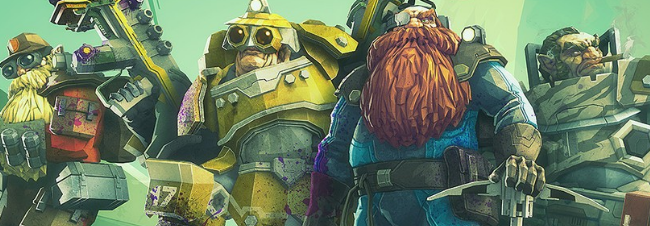
I wasn’t sure if I should put an Early Access title within my top ten at all, even at the bottom, but this has been one of the most polished gaming experiences I’ve had, official release or otherwise. Not only is the game constantly being updated, but has consistently met roadmap goals with a surprising degree of punctuality.
The premise of having a crew of four space dwarves hopping from planet to planet to work for an intergalactic mining company in a Left 4 Dead style is perfectly absurd, and that level of charm oozes through this interesting game in nearly every facet. From cheesy one-liners and belching after drinking a stat-boosting stout, to barely surviving an alien horde after a dangerous expedition, Deep Rock Galactic is an incredible way to spend an afternoon with friends. It’s the perfect little game to kill time with, and having such an engaging experience for a title that’s not even feature-complete yet makes it an exciting thing to look forward to each month.
9) Darksiders III
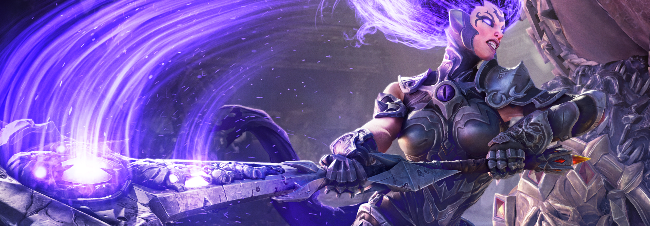
While this is still low on the list, it is still a surprising entry that I wasn’t really expecting to make my top ten. While moving away from a Zelda-like to more of a Souls-like might fly against what some people have enjoyed in the series up to now, Darksiders III definitely suited my personal tastes more closely. While I thought a lot of the story and character interaction was merely “fine”, I found myself actually pretty engrossed in the maze-like nature of the world along with the blend of souls-like and faster-paced action combat. In ways, the game felt like a throwback to last generation, but in a manner that I found myself mostly enjoying, like the more arcadey nature of the world’s bespoke divisions and the ability-driven lock-and-key progression reminiscent of something more like Metroid. It was an interesting mix of game styles that almost seemed to work a little better than it ever should have.
8) Octopath Traveler
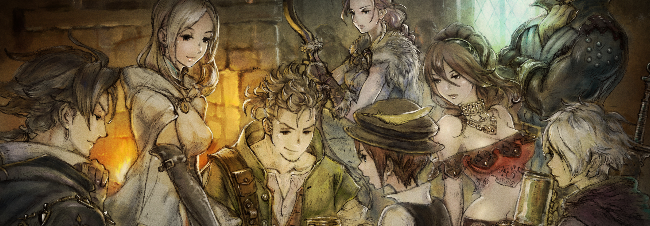
Octopath Traveler has a lot of little niggling issues that would annoy me in several other games. Primarily, I dislike the incredibly limited interaction of the game’s near-titular eight stories and characters. Yes, I did complete the late-game sidequest that does elucidate on several minor intersections of the individual narratives, but the general manner that these revelations were incorporated via optional content, tucked away to be read in chunks of prose, could not have been less engaging, in my opinion.
It might feel a bit arbitrary to criticize that aspect of the game so specifically, but it’s done mainly out of the respect I have for the individual stories that Octopath Traveler does manage to tell well. While there are a few minor pacing issues that result from requiring that every narrative branch to be told in a formulaic 4-part-and-location manner, there’s a sort of strength behind the earnest and low-key stories told alongside the fantastic soundtrack and entirely unique visual style. In addition, shifting focus from character to character allows the cast to feel a lot more well-rounded than a more typical JRPG’s party made up of mostly supporting characters, even if they don’t really interact like a traditional party. While not every experimental shot taken in Octopath's unique layout results in a bullseye, enough hit the mark to make this one of my most memorable games from 2018.
7) Super Smash Bros. Ultimate
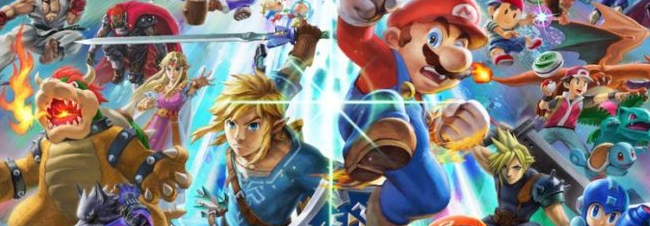
A latecomer to many of our libraries, but one that has been hotly anticipated all year long, Super Smash Bros. Ultimate really couldn’t have a better subtitle. While having all returning characters, stages, and the like alongside several newcomers is Ultimate’s clear selling point, and a strong one at that, I found almost even more enjoyment through some of the game’s tertiary components. I largely played this game with family and friends over the holidays, something that I imagine held true for many people, and with every unlocked character or sticker, a discussion would ensue about our familiarity with each.
Sometimes it was obvious, such as unlocking Pichu or Wolf for the first time in a long time. Others would have me explaining what I knew about a series that my younger siblings weren’t aware of, such as who Leif from Fire Emblem is. The best of which was when none of us knew what we had just revealed, such as running into whoever Galleom is (he was from Brawl, and no one remembered him.) It was this instant and continuous celebration of nostalgia while enjoying such a content-packed party fighter that has me already putting Smash in this list despite still being hot off the presses.
6) Overcooked 2
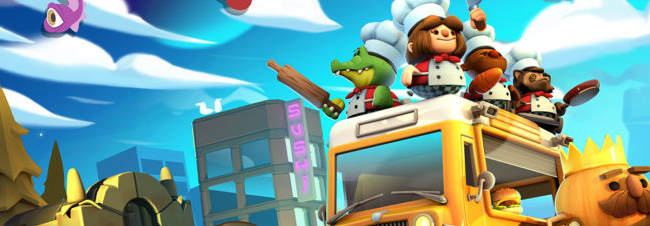
Another multiplayer game, but unlike Smash Brothers, I was not anticipating enjoying Overcooked 2 for nearly as long leading up to my first time with it. I, admittedly, had to work pretty hard to finally get some friends and family to try this silly cooking game with me, one that they had never heard of, but one round was enough to convince everyone to play chef for the next several hours, and to return several times since.
Overcooked 2 is a low-stakes game that’s pretty easy for most of its run, but it uses a formula that’s simple to grasp and find addicting within the first 30 seconds of play, a testament to the strength of its design. Helping direct any new stage to go from immediate chaos to something resembling order through teamwork and coordination brings about a sense of accomplishment that doesn’t get old easily. Throw in the absolute bonkers situations that can be thrown at the players, such as crashing into another restaurant and suddenly juggling two sets of orders, means the experience bounces between bewilderment and triumph regularly. I was admittedly a bit lucky, having several family and friends eager to play Overcooked 2 multiple times over the year, as the formula really only works as a multiplayer title, but it’s definitely one I would suggest checking out for veteran and novices alike if you can rope together a crew to dive in with.
5) Pathfinder: Kingmaker
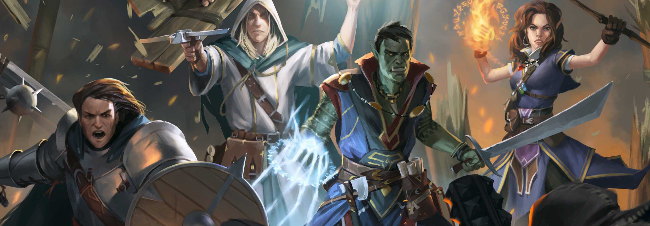
It might seem incredibly hypocritical to place a game that I reviewed relatively poorly so high up on a list of favorites for the year, but having spent over 100 hours with Pathfinder: Kingmaker, I suppose that means I also have a lot of thoughts on it. Released in an incredibly poor state that I touched on in my review, Kingmaker still had a lot of potential apparent despite the glaring issues.
I’ve never personally gelled with sim or management-style games, but incorporating those mechanics within a RTwP CRPG made for something that clicked with me instantly -- a sort of complementary experience that isn't to be found in inarguably more polished series like Pillars of Eternity or Divinity. Having several (eleven!) companion-focused storylines that extend past multiple quests, story arcs that build over time and incorporate these companions, and several unique encounter situations in several sorts of environments, Kingmaker with the issues sorted out would be a solid game on its own RPG merits, and the unique Kingdom mechanics only build on it from there.
I admit that some of my opinions on this entry are sort of baked into this expectation that updates will continue to iron out kinks in the title’s bugs and poor performance. But the last few months have set an incredibly promising precedent. Since I won’t get a chance to include Kingmaker on future lists unless the rules get really loose, I’m more than willing to put it on this year’s list. I'm eager to dive into the game's future DLC with a new playthrough at some point in 2019.
4) Valkyria Chronicles 4
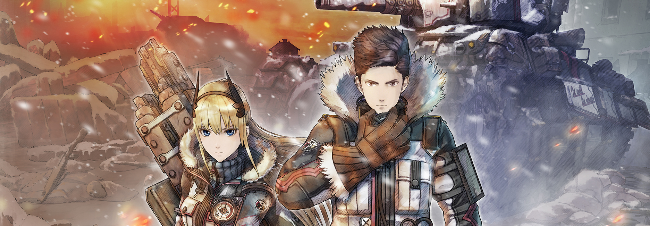
As a fan of Japanese SRPGS in the form of Tactics Ogre, Final Fantasy Tactics, Devil Survivor, and the like, the original Valkyria Chronicles was a sort of hybrid game that really scratched that specific sort of itch while also telling a sincere story, despite including a bit of wacky irreverence. Valkyria Chronicles 4 was the perfect return to the series, and though it plays near identically to the original release from a decade ago, it ended up being pretty much exactly what I wanted from a follow up the first game.
While Valkyria Chronicles 4 did include some new inclusions such as the Grenadier class and the Direct Command mechanic, these little additions didn’t really affect my enjoyment of the title in either direction and in fact may have helped to make certain strategies a little too exploitable (now you can bring friends with you during your scout rush). While the newest Valkyria Chronicles didn’t really surprise me in any way, I wasn’t expecting or wanting it to. Just having more maps and situations to work through, and plenty of optional maps and challenges to tackle was enough to keep me hooked. Getting that critical-health unit to run to the last flag on the last turn always feels relieving and rewarding.
3) Pillars of Eternity II: Deadfire
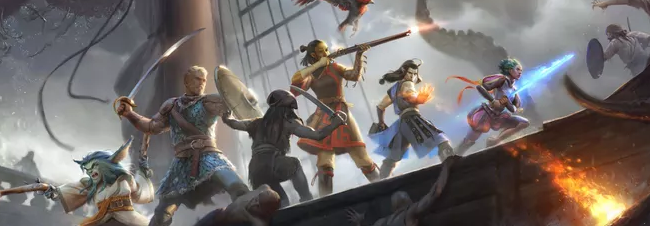
The hardest part of this list, perhaps surprisingly, was trying to sort out the 2nd and 3rd positions. While having difficulty choosing the number 1 entry on the list would perhaps be a bit more properly dramatic, it was still a fair bit of drafting in order to arrive at the final order. While Pillars of Eternity II: Deadfire may have just fallen a bit short in my personal deliberations, it’s more a testament to the strength of the other entries rather than some specific shortcoming of Deadfire.
Deadfire excels in the areas that an Obsidian Entertainment title would generally be expected to: world-building and writing. Having every character in the game fully voiced remains a contentious decision among series and genre fans, but it was one that I fully support. By having all of the lines voiced, each character is, in a way, mediated to the extent that they can blather on (I’m looking at you, Durance). There’s maybe a bit too much in-world slang and colloquialisms present, but it does give the dialogue in Deadfire a bit of a unique flavor that does give an additional avenue for story-telling.
Personally, I enjoyed the relatively low-stakes, abbreviated narrative present in Deadfire, and found myself enjoying the moment-to-moment character interactions, exploration, and discovery even if the main thrust of the game feels an act too short. The sheer number of class combinations possible and party compositions also means that's there's always plenty of experimenting to do on that front as well. The post-release DLC content has pushed both strengths of the game even further, and has cemented Deadfire as one of my go-to recommendations for those interested in trying this sort of game for the first time.
2) Dragon Quest XI: Echoes of an Elusive Age
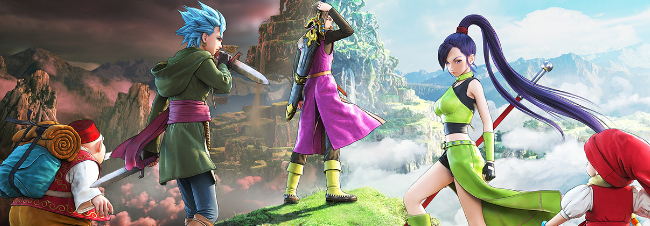
The winner of the previously-mentioned deliberation happens to be Dragon Quest XI: Echoes of an Elusive Age, as you have probably already deduced. It was my first Dragon Quest title, and I couldn’t really have been more glad to have jumped on board. Comparing it directly to something like Deadfire is not easy, as the games are entirely different, but Dragon Quest won me over, despite going in with a lack of familiarity with the series. Put simply, I had a blast with this game.
Describing Dragon Quest as a classically styled JRPG with traditional structure and a lack of modern flair is probably something like describing spaghetti and meatballs as a sauce-laden noodle dish to an Italian – it’s not exactly an enlightening statement. But in an era where action games are becoming more like RPGs and JRPGs more like action games, and where RPGs of all sorts are becoming service-style games while hybrid genres and mechanics are more common than they are not, playing something like Dragon Quest is almost actually refreshing.
A story of hope, redemption, and courage, Dragon Quest isn’t paving the way, but certainly knows how to put a fresh coat of paint on a well-traveled road. Coupled with a gorgeous art style, some fantastic locations, and surprisingly deep, nuanced characters, experiencing Dragon Quest’s collection of character-focused vignettes coalesce into a huge, sweeping epic was my favorite self-contained gaming experience of the year. The way that the game’s second and third acts mirror each other in a very particular way was also something that stuck with me strongly – describing it fairly without spoilers is a tricky thing to do, but it’s designed in a way that I thought was incredibly new and clever from both a storytelling and mechanical standpoint.
The localization, voice acting, even the crafting system, I feel like there’s not really a single component of Dragon Quest XI that doesn’t just elevate the experience further. No aspect feels especially under-designed or overcooked. Just a great JRPG that all fans of the genre should play, even if you're new to the series. I can (almost) guarantee you won’t be disappointed.
1) Monster Hunter: World
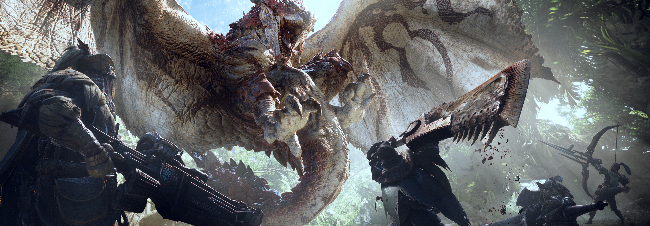
In 2017, I never would have expected that I would have put over 200 hours into a Monster Hunter game by the end of the next year. I had never really played a game in the series before, outside of a handful of minutes of Freedom Unite for the PSP. At the time, I had tried playing it alone as a solo player, and I couldn’t really muster up the motivation to play the admittedly repetitive nature of the game on a portable device an extended number of times. Obviously, the series had built a strong following in that fashion, but it just didn’t align with my tastes.
Who knew bringing the game to PC with a few design tweaks would completely turn my opinion around.
I can’t speak for anyone but myself, obviously, but I feel like Monster Hunter: World was the sort of game that PC players had been waiting all their gaming lives for. I personally started playing World with members of an MMO guild, and before we knew it, we had a new channel in our chat server specifically for our Hunters – we had a unique role for the game as well. Needless to say, it caught on quick.
With every hunt came a new party configuration, new weapons with unique playstyles, emergent stories of the near-victory or the last-second kill, and despite the built-in repetition of the game’s systems – it never became completely rote or routine. World’s festivals events, Bounty system, and Event quests all played a role in accomplishing this, of course, but the strength of the multiplayer experience, alongside PC-centric community-led services like Steam groups and Discord servers, helped to cement its staying power well after release. Obviously, I’m not placing these PC-specific anecdotes to disservice how well Monster Hunter: World’s done on every system, but more to just illustrate an example of why and how some series’ neophytes like myself were happily drawn in to give Monster Hunter a first (or, technically second) chance.
The announcement of Monster Hunter: World - Iceborne late this year almost has me wanting to put 200 hours in again and do something I had never done up until now - anticipate a new Monster Hunter title. My experience with World was that positive, and it's why I list it as my personal Game of the Year.